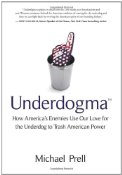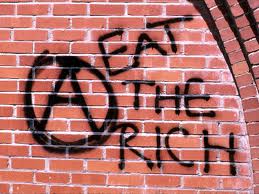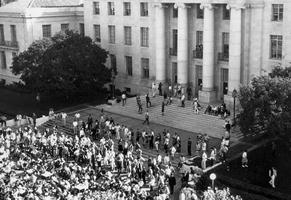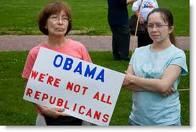
An Interview With Michael Prell, Author of Underdogma
After reviewing a new book by Michael Prell, I decided to reach out to him for an interview. Mr. Prell very generously allocated his time to answer a few questions about the phenomenon he has named Underdogma.
 Section 1: Background Information
Section 1: Background Information
Martin: You have a wide and varied background. You’ve rubbed shoulders with some pretty elevated public figures. (See, I can read the dust jacket on your book as well as anyone.) How did you end up doing what you’re doing today?
Michael: I’m blessed to be able to go where I’m needed. None of it was easy, and none of it happened overnight, but here’s a secret: do what you love, for the people you love, and do it for free. If you’re good, eventually someone will pay you for doing what you love.
Martin: Who is the most impressive public figure you have worked with? From the outside, looking at the list of luminaries you’ve worked with, my guess would be Mr. Netanyahu, what is he like?
Michael: I’ve had the great pleasure of working with many high profile public figures, and I’ve found that the exceptional ones are always hard-working. That’s how they become exceptional. Mark Meckler and Jenny Beth Martin of the Tea Party Patriots: it’s jaw-dropping how much of themselves they give to the country. Prime Minister Netanyahu? 100% dedicated and generous with his time. All of the talk radio show hosts I’ve been with on the Underdogma media tour: it seems easy when you hear them on the radio, but most people have no idea how much time and work and passion goes into putting on a show. As Rush Limbaugh says: “the great ones make it look easy.†That has been my experience working with all of these great people.
Martin: How did you end up working “on four continents?â€
Michael: I follow my passions, go where I’m needed, and good things happen.
Martin: What exactly do you do for the Tea Party Patriots? Is this a paying gig or is this a labor of love, or some of both?
Michael: I have not been paid for my work with the Tea Party Patriots, and in fact I give my time and money to the cause. I also give all my author royalties to Tea Party Patriots who sell Underdogma as a fundraiser at their Tea Party events. Details at www.TPPfundraiser.org
Martin: How did this book come about?
 Michael: When I see things that don’t appear to make sense, it bothers me. Like Americans protesting against America and cheering for foreign terrorists who would kill them if given half the chance, or gays and lesbians championing Palestinians and railing against Israel—even though Palestinians kill homosexuals, while Israel protects gay rights and even hosts World Pride Day. So I look for patterns. The pattern I found—in these and many issues that shape the world today—is that many people have a non-thinking, gut instinct to take the side of “the little guy,†the underdog. And, while this “Underdogma†instinct is relatively harmless while watching the NCAA Final Four, it has profound consequences when applied to big issues like American power.
Michael: When I see things that don’t appear to make sense, it bothers me. Like Americans protesting against America and cheering for foreign terrorists who would kill them if given half the chance, or gays and lesbians championing Palestinians and railing against Israel—even though Palestinians kill homosexuals, while Israel protects gay rights and even hosts World Pride Day. So I look for patterns. The pattern I found—in these and many issues that shape the world today—is that many people have a non-thinking, gut instinct to take the side of “the little guy,†the underdog. And, while this “Underdogma†instinct is relatively harmless while watching the NCAA Final Four, it has profound consequences when applied to big issues like American power.
Martin: Just for fun, who is your favorite president and why? Least favorite and why? (I might be able to guess this one 🙂
Michael: I haven’t yet fully succumbed to the “Presidential historian bug,†but when I do, it’s going to take me down hard and probably obsess me for years or decades. Right now, I’d have to say that Ronald Reagan was a great President, and an even more brilliant communicator than those of us who call him “the great communicator†give him credit for. Watch his farewell address. He was in another league. As far as worst Presidents go; the jury is still out, and Barack Obama has only had 2+ years (although he has done much damage in that time), but the lifetime award for being morally wrong on just about everything has to go to Jimmy Carter.
His consistent moral bankruptcy has been breathtaking for the past 3 ½ decades.
Section 2: The Underdogma Phenomenon
Martin: How did you end up diagnosing/recognizing this phenomenon? I found it fascinating how well it fits as a causal effect for so much of what is happening today. Is it a primary defect or itself a symptom of another problem?
Michael: I was forced to confront this phenomenon when I saw educated, multi-cultural, North American university students spitting on Jews and stopping a man (Benjamin Netanyahu) from engaging in free speech in what should have been a bastion of free speech: a university campus. After five years of research, I came to fully understand this phenomenon I named Underdogma: which leads millions of people around the world to make determinations of “right†and “wrong†– not based on whichever side is actually right or wrong, but simply on whichever side has less or more power.
Martin: Underdogma almost seems like a mental illness. You point out in the book that it runs counter to nature; it certainly makes no logical sense. You indicate that people are sometimes suicidal in their devotion to this false ideal. Why is that the case?
 Michael: Underdogma is not a mental illness as much as it’s a mental bypass. It has the power to bypass the rational mind and cause many people to instinctively take the side of the underdog, in any given issue, and raise a fist against the powerful—even when those underdogs would kill them if given half the chance, and even when those “overdogs†would save their lives. It’s a gut reaction, not a thinking reaction. If people only thought with their rational minds, then most people in the world would love America: because America is, and has been, one of the greatest forces for good the world has ever known. If you don’t believe that’s true, try imagining a world in which the world’s biggest murderer, polluter and internet censor (Communist China) is the world’s #1 power. We won’t have to imagine that for long, because it will become a reality within your lifetime if America keeps bowing down, apologizing for its power, and giving its power away.
Michael: Underdogma is not a mental illness as much as it’s a mental bypass. It has the power to bypass the rational mind and cause many people to instinctively take the side of the underdog, in any given issue, and raise a fist against the powerful—even when those underdogs would kill them if given half the chance, and even when those “overdogs†would save their lives. It’s a gut reaction, not a thinking reaction. If people only thought with their rational minds, then most people in the world would love America: because America is, and has been, one of the greatest forces for good the world has ever known. If you don’t believe that’s true, try imagining a world in which the world’s biggest murderer, polluter and internet censor (Communist China) is the world’s #1 power. We won’t have to imagine that for long, because it will become a reality within your lifetime if America keeps bowing down, apologizing for its power, and giving its power away.
Martin: I notice you have an upcoming chapter that deals with God and Underdogma. It was referenced in the book but is not out yet. How does religious belief, or lack thereof, factor in to one’s predilection to be an Underdogmatist? I’ve heard the argument made that man needs something to believe in and that in the absence of God he invents one. A prime example of this is the environmental movement where we see people worshipping nature and, as you point out in the book, even advocating for the destruction of large portions of the human race. Is Underdogma a substitute for religion?
Michael: There’s an old saying: if you don’t believe in God, you’ll believe in anything. Some people believe in worshipping “Mother Earth,†and hating mankind as though he were the devil. I wrote a piece on this recently that focused on “The Law of Mother Earth,†which is now being considered by the United Nations. If you read the law itself, or read the writings and statements of many environmentalists, there is a common thread that portrays mankind as a too-powerful “cancer,†rather than an indigenous species of “Mother Earth.†Underdogma is not a substitute for religion, but people who operate on the non-thinking instinct that says; whichever side has less power (shrubs, trees) is automatically good because they have less power, and whichever side has more power (mankind) is automatically bad because they have more power, are more likely to buy into quasi-religious “Mother Earth†worship.
Martin: What went wrong? How can so many people be so foolish?
Michael: There was a tipping point in the mid-1960’s (which I get to in the next question), but the short answer is: the reason why so many people can be “so foolish†as you put it, is because it is far easier to be foolish than not. If we look at America’s founding principles, and the instructions left by America’s Founding Fathers, they were not meant to be carried out by the slothful. Generations of Americans worked hard to make America great and exceptional. The young people who came of age in the mid 1960’s (who now occupy positions of power in America) were the first generations of Americans to come of age in “America the Superpower.â€Â In other words, they were born #1. Which means they did not have to go out and earn their power. They grew up thinking that that was the way things had always been, and so they didn’t value it or treasure it. Worse, when it came time for them to rebel (as it does with every generation) they rebelled against America the superpower. That was when the “fight the power†movement began, which was the seminal moment for Underdogma.
Section 3: Founding Fathers, the Anti-Underdogma
Martin: When your publisher contacted me, I was somewhat dubious about reviewing the book. It wasn’t that it did not look interesting, it is just that we have a tremendous backlog of topical books (American History) in the queue. However, all the authors at WWTFT are bibliophiles and so find it hard to refuse a book! Upon reading Underdogma, however, I was happy to discover a significant tie in to our site’s theme. In the last chapter of the book, you assert that Underdogma is the antithesis of the American dream and of American Exceptionalism. How did we get from George Washington to Barack Obama?
 Michael: Underdogma is precisely the opposite of the belief system that built America: the American Spirit, the desire to be #1, the can-do attitude that says “anyone can grow up to be President.â€Â A lot of demographic, philosophical and historical elements came together in the mid 1960’s to form a tipping point. The people who formed that tipping point (the Berkeley student protests and the “fight the power†movement they spawned) now occupy the highest seats of power in the land. And now America is led by a President and a series of czars who feel that American power and greatness are things to bow down and apologize for. There is an entire chapter in Underdogma that explains how things went wrong and precisely when they went wrong, but the short answer is: Berkeley in the 1960’s, when the “fight the power†movement began.
Michael: Underdogma is precisely the opposite of the belief system that built America: the American Spirit, the desire to be #1, the can-do attitude that says “anyone can grow up to be President.â€Â A lot of demographic, philosophical and historical elements came together in the mid 1960’s to form a tipping point. The people who formed that tipping point (the Berkeley student protests and the “fight the power†movement they spawned) now occupy the highest seats of power in the land. And now America is led by a President and a series of czars who feel that American power and greatness are things to bow down and apologize for. There is an entire chapter in Underdogma that explains how things went wrong and precisely when they went wrong, but the short answer is: Berkeley in the 1960’s, when the “fight the power†movement began.
Martin: What role did Underdogma play in the election of Barack Obama? He seems to be the anti-Reagan. Do you think that the American people would still respond to someone who is unabashedly pro-America?
Michael: There is a part in Underdogma where I show how every major candidate for President in 2008 played the underdog card at some point. But I don’t think Barack Obama ran an Underdogma campaign. The modern-day Democratic Party is swimming in Underdogma and class warfare (demonizing rich and powerful fat-cats, deifying the “little guy†underdogs), but Obama did his best to cover up his Underdogma during the campaign, and instead ran as a self-described empty vessel filled with hope. After Obama achieved power, though, he let his Underdogma run loose: everything from going on worldwide apology tours to demonizing wealthy and successful and powerful Americans at home.
Martin: As you point out in your book, Underdogma would be unthinkable to the Founders. In my studies to date, it seems like the founders were classical liberals to varying degrees. All of them, even Hamilton, could reasonably be termed republicans with a small ‘r.’ Conversely, is Underdogma exclusively the province of the Left? Would you agree that all underdogmatists are on the left, but not all those on the left are underdogmatists?
Michael: You bring up a good point, and it’s a “which came first: the chicken or the egg†question. In America, there used to be a baseline understanding—among Democrats and Republicans—that America is exceptional, and American power is a force for good in the world.
 But Democrats like John F. Kennedy would get turfed out of today’s Democrat Party faster than Joe Lieberman. So, I don’t think there is anything inherent about Democrats that make them Underdogmatists. But hard-left, America-hating Underdogmatists have flooded the Democratic Party, to the dismay of many good, America-loving, lifelong Democrats who believe in the American Dream. In this case, the Underdogmatists are winning, and have all but taken over the Democratic Party, which is why you see so many former Democrats at Tea Party rallies, or now calling themselves “Independents.â€Â They didn’t leave their Party. Their Party left them for Underdogma.
But Democrats like John F. Kennedy would get turfed out of today’s Democrat Party faster than Joe Lieberman. So, I don’t think there is anything inherent about Democrats that make them Underdogmatists. But hard-left, America-hating Underdogmatists have flooded the Democratic Party, to the dismay of many good, America-loving, lifelong Democrats who believe in the American Dream. In this case, the Underdogmatists are winning, and have all but taken over the Democratic Party, which is why you see so many former Democrats at Tea Party rallies, or now calling themselves “Independents.â€Â They didn’t leave their Party. Their Party left them for Underdogma.
Martin: Your call to action at the end of the book is a personal one. Each of us individually has to step up and embrace the principles upon which this country was founded. WWTFT is an attempt to raise awareness of those principles in the same way that Underdogma seeks to “lift the veil.â€Â Are you optimistic about returning to our founding principles?
Michael: If you had asked this question, just over two years ago, what do you think your answer would be? President Obama had just been inaugurated, any criticism of him was branded as racism, the Republicans were retreating with their tails between their legs, and the White House was running America into the ground at high speed, using the Global Financial Crisis as a drum to beat for every wrong-headed socialist policy back to life from the ash-heap of history. And then, with no money or expertise or power, the American people rose up through the modern- day Tea Party movement and rekindled the spirit that built this nation. Within two years, they profoundly shifted the debate in America and shifted the balance of power in Congress in the 2010 midterm elections. If the American people can do that, in just over 2 years, they can do anything.
Section 4: The Usual Questions
Martin: What did I miss? Is there something I should have asked about, but did not?
Michael: Seriously, this is one of the most thorough interviews I have yet done. My hat is off to you, Martin.
Martin: If there was one important point that you wanted everyone to take away from your book, what would it be?
Michael: What people get from the book is clarity. Even if you think you’re immune from Underdogma: think again. I guarantee that, when you read the Underdogma, you’ll find part of this belief system rattling around in your subconscious, affecting your life in some way. And then in the last part of the book, I give you the tools and research and historical touchstones you’ll need to push back against those who reflexively heap scorn on America, the superpower. So, what you get from reading Underdogma is clarity, and an arsenal of new weapons to fight back against the “hate America first†crowd.
Martin: What is your next project? Do you have another book in the works? More “bonus†chapters? What is your plan for the website? It seems like you are trying to foster interaction there.
Michael: Several more books, including a sequel to Underdogma, and some unexpected ones too. Plus a TV series coming out, and a few other things. Go to www.under-dogma.com sign up for the free Underdogma newsletter, and you’ll be the first to know about everything. And you’re right, this is a two-way street and I want people to interact; first because it fills my heart, and second because good things happen when good people connect. For instance, the “sell Underdogma to raise funds for your Tea Party group†idea (www.TPPfundraiser.org) came from a local Tea Party organizer, and now we’re doing it across the country in 30 States and growing. The comments section over on my Facebook page is a great place to interact and connect with thousands of great people, and I’ve been known to give away free autographed copies for the best comments.
Martin: Thanks so much! May I follow up if I or someone at the blog has more questions?
Michael: Absolutely.
 The posts are coming!
The posts are coming!


1 comment
Good interview Martin. Darn. Now I have another book to read and I can’t even review it on WWTFT.
[Reply]
Leave a Comment